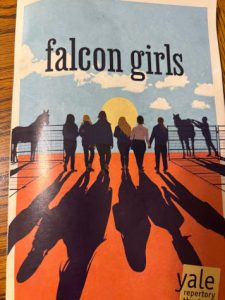
Falcon Girls at The Yale Rep
Falcon Girls by Hilary Bettis, now receiving its world premiere at the Yale Rep, is a grab bag of characters, themes, issues, and notions that comes across more as notes for episodes in a multi-season TV mini series than a fully formed play. That’s perhaps not too surprising since Bettis’s bio contains a laundry list of streaming services for which she has written or has ”multiple TV shows in development.”
Set in 1994, Falcon Girls tells the story of a team of adolescent girls from ranching families in the small Colorado town of Falcon, a stone’s throw from Colorado Springs, who are competing in a series of FFA events. These contests pit girls from communities across the state to find which team has the most in-depth knowledge of equine anatomy – in short, which is the best judge of horse flesh. The victors will go on to the national competition in Kansas City.
By the way, if you have no idea what FFA stands for, the excellent program notes provided by dramaturgs Lara Priya Sachdeva and Amy Boratko, along with a note from playwright Bettis, will bring you up to speed. However, let me reassure you that you can enjoy the show with no prior knowledge of Future Farmers of America.
Falcon Girls is an autobiographical memory piece. The main protagonist, Hilary (“one L”) shares the playwright’s name after all and she tells us in her program note that the play is an attempt to come to grips with “my own life, the people I love, the kids I grew up with.” Good for her.
For all the virtues of Falcon Girls, the play suffers from the loose, one might almost say non-existent, narrative structure that characterizes so much of today’s episodic television. It begins, it meanders, incident follows incident, and then breaks rather arbitrarily for intermission. The second act continues in this vein until it ends ambiguously. The audience sat in black silence for a while before it realized that the time had come too applaud.
Bettis does a good job of evoking the exquisite agony of adolescence as her girls wrestle with the WWJD religiosity of their proper prairie upbringing and their raging hormones. (Those huge horse penises make a girl think!) On the other hand, her handling of issues like teen pregnancy, abortion, and the cruelty of kids to one another seems formulaic in a movie-of-the-week sort of way.
Under the kinetic direction of May Adrales, Falcon Girls is receiving an exemplary production. She has drawn vivid, if occasionally over-emphatic performances from her cast of girls, inevitably and unfortunately much older than the 14-year-olds they portray. She has also found ways to accommodate the cinematic flow of short scenes and rapidly changing locations.
Among the energetic cast, a few stand out. Gabrielle Policano is persuasive as Hilary, who holds a sad secret that belies her innocent facade, and Sophia Marcelle is delightful as the sexually precocious Jasmine. Solid support comes from Teddy Cañez as Mr K, an avatar of enlightened adult male supervision of this unruly gaggle of girls.
As seems to be the case in every Yale Rep production, one of the highlights of Falcon Girls is the set. Beowulf Borrit has provided a malleable structure of weathered barn wood that opens to reveal a row of high school lockers and then opens further to take us into the wide open spaces of the Colorado llano.
The lighting by Kyle Stamm, along with the projections of Christian Killada, and the sound design of Joyce Ciesil, add immeasurably to the excitement of Adrales’ staging.
Falcon Girls continues at the Yale Rep through November 2, 2024. For more information and to purchase tickets visit the Yale Rep website.
Footnote: The Blyth Festival in far off Blyth, Ontario, covered similar ground in this season’s production of Onion Skins and Peach Fuzz: The Farmerettes and did so more successfully to my way of thinking.
That show, about young girls who pitched in on Ontario’s farms during World War Two, also dealt with the tensions, jealousies, and family travails of youth, but the overall effect was one of loving remembrance. Falcon Girls left me with a feeling of bittersweet melancholy for these kids and their hardscrabble existence.
Perhaps Bettis felt that a certain “edginess” was needed to appeal both to contemporary sensibilities and to those streaming services. Perhaps she feared being labeled “sentimental,” a death sentence for the modern playwright. Fair enough. Even so, in theatrical terms, there’s something to be said for the rosy glow of nostalgia.
For a complete index of reviews CLICK HERE.
Don’t miss another review or blog post! SUBSCRIBE HERE.

